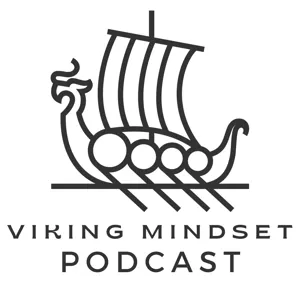Podcast Summary
Understanding the Differences Between Father Wound and Daddy Issues: The father wound and daddy issues are related but distinct, with the father wound focusing on emotional connection and the latter often sexualized. Acknowledging and healing from these experiences with compassion is crucial.
The father wound and daddy issues are related but distinct concepts. The father wound refers to a perceived lack of love or emotional connection from one's father, while daddy issues are often sexualized and can stem from a variety of experiences with father figures. It's important to acknowledge and explore these wounds with compassion for ourselves and our fathers, recognizing that our parents do not have to be monsters for us to have these experiences. Separating these concepts can help us better understand and heal from the impacts of our relationships with our fathers.
Understanding the Father Wound's Impact: Recognizing the father wound's impact on emotional development and relationships is crucial. Past experiences, whether intentional or not, shape us and can influence present relationships. Unpacking these experiences can help break free from their limiting effects.
The label of "daddy issues" often focuses on women's perceived issues with relationships, rather than examining the potential impact of their father figures on their emotional development. The father wound, which can stem from a perceived lack of love or emotional connection, can shape individuals' relationships and self-perception in significant ways. This shaping often occurs during the formative years, even if it's not consciously recognized at the time. Developmental trauma, which includes both what was experienced and what was not, can have a profound impact on individuals' emotional and relational lives. It's essential to recognize that our past experiences, whether intentional or not, shape us and can influence our present relationships. Unpacking these experiences can help us break free from their limiting effects.
Early experiences shape who we become as adults: Our first 9 years significantly impact our emotional and physical development, influencing how we interpret and respond to emotions and experiences throughout life. Past traumas, no matter the size, can have profound effects on emotional development.
Our early experiences with our primary caregivers during the first 9 years of our lives significantly shape who we become as adults. These experiences, whether positive or negative, are absorbed and interpreted by our developing brains, and we connect our sense of self to the behaviors of these caregivers. Our emotional and physical needs are intertwined, and if one is not met, we may still try to seek connection despite safety concerns. This early programming influences how we interpret and respond to emotions and experiences throughout our lives. It's important to remember that traumas, no matter how small or seemingly insignificant, can have profound effects on our emotional development. Our brains interpret emotions based on past experiences, and these interpretations shape our emotional wisdom and sense of self. Therefore, it's crucial to consider the full scope of our early experiences when understanding our emotional responses and relationships as adults.
Early Childhood Experiences Shape Us Deeply: Understanding our childhood experiences, especially those in theta wave state, can help us recognize patterns and beliefs shaping our relationships and attractions later in life. Trauma isn't the experience but the body's response, requiring communication, self-compassion, and healthy boundaries for healing.
Our early childhood experiences, even if they seem insignificant, can shape our beliefs and attachments in profound ways. Children naturally believe the world revolves around them, but as they grow, they learn that not everything is about them. Repeated patterns of behavior during these formative years, often when we're in a theta wave state, can lead to internalized beliefs about worthiness and attention. These experiences form our blueprint or programming, which can influence our relationships and attractions later in life. It's essential to understand that trauma isn't the experience itself but how the body responds to it. Communication, self-compassion, and healthy boundaries are crucial in managing these impacts on our children. Additionally, it's important to recognize that a father's role extends beyond just his relationship with the child; his behavior towards the child's mother can also contribute to a father wound.
Fathers' emotional connections impact relationships later in life: Understanding emotional abandonment from fathers and recognizing its signs can help individuals heal and form healthier relationships in the future.
Our relationships with our fathers, both positive and negative, significantly shape how we attract and form relationships with men later in life. This includes emotional connections, as emotional neglect can be just as damaging as physical or verbal abuse. The ability of our fathers to express emotions and provide emotional support is crucial for our emotional development. Unfortunately, many fathers lack this emotional intelligence, leaving their children without the necessary emotional foundation. This can result in individuals growing up to be hyper-independent or uncomfortable with vulnerability, among other things. Understanding the impact of emotional abandonment and recognizing its signs can help individuals heal and form healthier relationships in the future.
Early experiences with father figures shape emotional development: Understanding the impact of early father-child relationships can help us break free from emotional patterns and foster healthier relationships.
Our early experiences with our parents, particularly with the father figure, significantly shape our emotional development and our ability to regulate our emotions later in life. If we grew up feeling unseen, unheard, or unvalidated, we may carry a deep desire for connection and validation, leading us to adopt masculine traits and motivate ourselves through criticism. On the other hand, if our father figures struggled with emotional regulation themselves, they may have difficulty providing the emotional support we needed, leading to a cycle of unmet needs and dysregulation. Ultimately, understanding these dynamics can help us break free from repeating patterns and foster healthier, more fulfilling relationships.
Understanding parents' past experiences and traumas: Recognize parents' complexities, assess emotional availability, and focus on the reparenting of self for personal growth
Understanding the root causes of emotional wounds, such as a father's unavailability, can provide valuable insight but may not necessarily heal the pain. It's essential to recognize that our parents' past experiences and traumas can impact their ability to connect emotionally, and it's up to us to break the cycle and reparent ourselves. Additionally, emotional availability can be assessed through four categories: sensitivity, responsiveness, engagement, and consistency. By recognizing these aspects, we can strive to develop healthier relationships and improve our own emotional well-being. Remember, it's not about blaming or shaming our fathers for their shortcomings, but rather acknowledging the complexities of their experiences and focusing on our personal growth.
Understanding our relationship with our fathers through sensitivity, structuring, intrusiveness, and hostility: Recognizing our parents' emotional availability and its impact on our relationships in adulthood can lead to self-awareness and healthier connections.
Reflecting on our relationship with our fathers through the lenses of sensitivity, structuring, intrusiveness, and hostility can provide valuable insights into our own emotional availability and the potential impact on our relationships in adulthood. Our instincts as children are crucial, and when they are ignored or invalidated, it can lead to a pattern of mistrusting ourselves and our ability to read emotional signals. Understanding these categories can help us categorize our parents' emotional availability and bring self-awareness to any potential patterns in our relationships. Additionally, recognizing the importance of sensitivity, learning support, and healthy emotional expression can contribute to healthier and more fulfilling relationships in the future.
Understanding the Impact of Father-Child Relationships on Emotional Development: Effective communication, emotional availability, and healthy coping skills are crucial for a child's emotional wellbeing in their relationship with their father. Reparenting can help heal past wounds and promote healthier relationships in the future.
Our relationships with our parents, particularly our fathers, significantly shape our emotional development and coping mechanisms. While some may seek comfort in fantasy bonds or avoid painful emotions, it's essential to understand the importance of emotional availability in parent-child relationships. The ability to be emotionally connected, tuned to a child's emotions, and exhibit healthy coping skills are crucial for a child's emotional wellbeing. However, no parent is perfect, and it's essential to recognize that even therapists acknowledge this. The complexities of parenting can lead to inconsistencies and immaturity, but it's crucial to ensure that children have a safe place to express their emotions and have their needs met. Effective communication and the concept of reparenting can help heal the father wound and promote healthier relationships in the future. Reparenting is a long and loving journey towards healing, and it's essential for those affected to prioritize self-work and seek support when needed.
Healing from a father's absence or inadequacy: Reflect, separate, reparent, recognize and address emotional unavailability, and foster emotional awareness in children to prevent repeating patterns.
Understanding and addressing the emotional impact of a father's absence or inadequacy is a crucial part of personal growth and healing. This can involve reflecting on our own experiences, separating them from our mother's interpretations, and practicing self-reparenting by providing ourselves with the missing elements from our past. Reparenting can take various forms, such as establishing new routines, prioritizing self-care, and buying ourselves things we didn't have growing up. Additionally, recognizing and addressing our emotional unavailability and shadow self through journaling and self-compassion can help us break cycles and attract healthier relationships. For parents, fostering emotional awareness and expression in their children can help prevent them from repeating similar patterns.
Understanding emotional needs and father figures: Recognizing emotional needs and healing past wounds through therapy and self-reflection can lead to personal growth and stronger relationships.
Recognizing and addressing emotional needs, particularly in relation to father figures, is crucial for personal growth and healthy relationships. It's essential to understand that people may struggle to articulate their feelings, and creating a safe space to communicate and normalize emotions can be transformative. Therapy and self-reflection are valuable tools for healing from past wounds and learning to connect with ourselves and others. By acknowledging the complexity of emotional experiences and the importance of communication, we can foster deeper connections and build stronger relationships.






